Key takeaways:
- Emotional support fosters a sense of belonging, validation, and can be a catalyst for personal growth.
- Effective support strategies, such as mindfulness and positive affirmations, significantly enhance self-esteem and coping abilities in individuals with dyslexia.
- Building a support network, including friends, educators, and online communities, is crucial for navigating challenges and gaining new perspectives.
- Accessing resources like workshops, books, and therapy can transform emotional health and improve resilience against stress and anxiety.
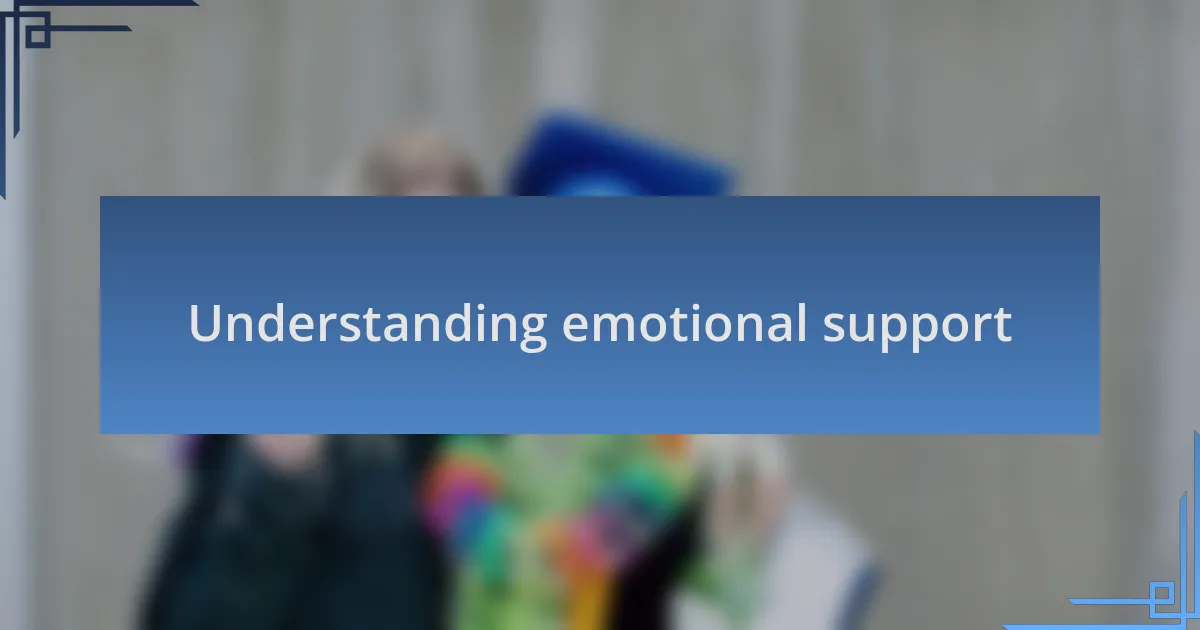
Understanding emotional support
Emotional support is often about having someone who listens without judgment. I remember a time when I was struggling with self-doubt related to my dyslexia. My friend sat with me for hours, just allowing me to express my feelings, and that made all the difference. It’s those moments of connection that remind us we’re not alone.
One aspect of emotional support I’ve found invaluable is encouragement during challenging times. I’ve had days when reading felt overwhelming, and instead of pushing through in silence, I reached out to my support group. Their reassuring words reminded me that setbacks are part of the journey—how often do we forget that it’s okay to lean on others?
It’s fascinating how emotional support can manifest in so many forms. Sometimes, it’s a simple text message from a friend saying, “I’m thinking of you.” Other times, it’s someone sharing their own story of struggle. These gestures foster resilience, inspiring us to keep moving forward. What support systems have you built, and how have they impacted your journey?
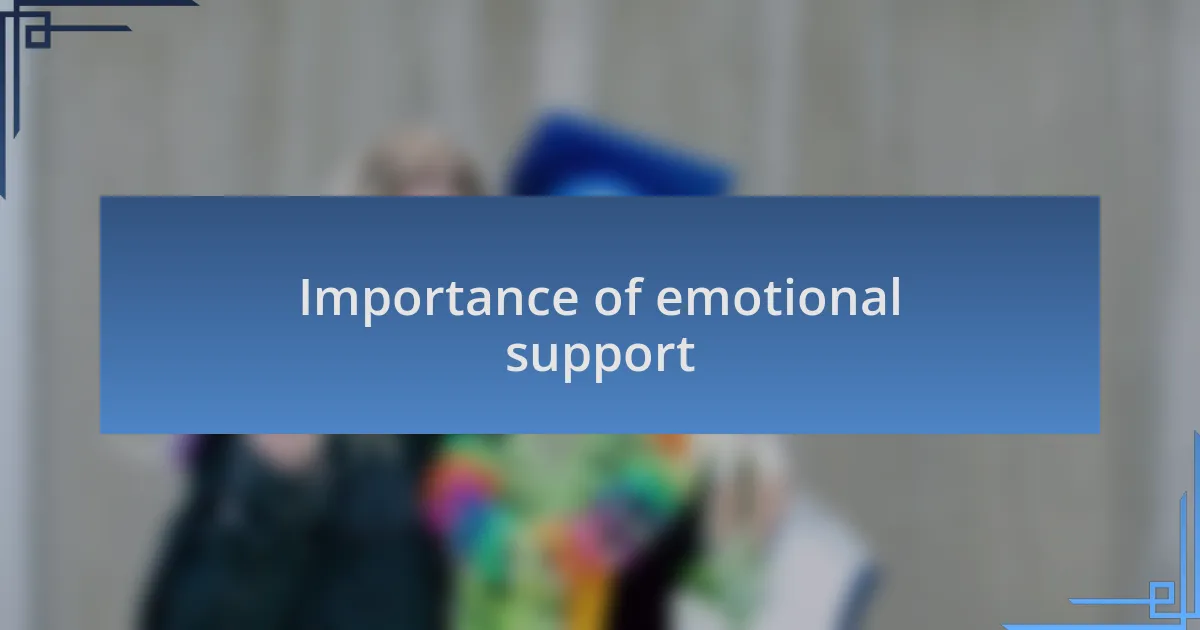
Importance of emotional support
Emotional support is essential because it fosters a sense of belonging and safety. I vividly remember when I faced a particularly challenging week; the fear of judgment loomed over me. One evening, I shared my anxieties over dinner with close friends, and their immediate reactions were supportive and non-critical. It was then that I realized how powerful it is to have people around who validate your feelings. Isn’t it comforting to know you have allies in your corner?
In my experience, emotional support often becomes a catalyst for personal growth. For instance, there was a time when I received constructive criticism about my writing. Initially, my heart sank; but with the encouragement from a mentor who believed in my potential, I was able to embrace that feedback. Have you ever found that a supportive voice helped you turn a setback into a learning opportunity?
The role of emotional support extends beyond just comfort; it can be a crucial factor in maintaining mental well-being. I’ve noticed that during times of heightened stress, reaching out to someone who understands my dyslexia led to a clearer perspective on my challenges. It’s astounding how quickly we can shift our mindset with just a little encouragement. Are we not often our own worst critics, and isn’t it essential to have someone remind us of our strengths?
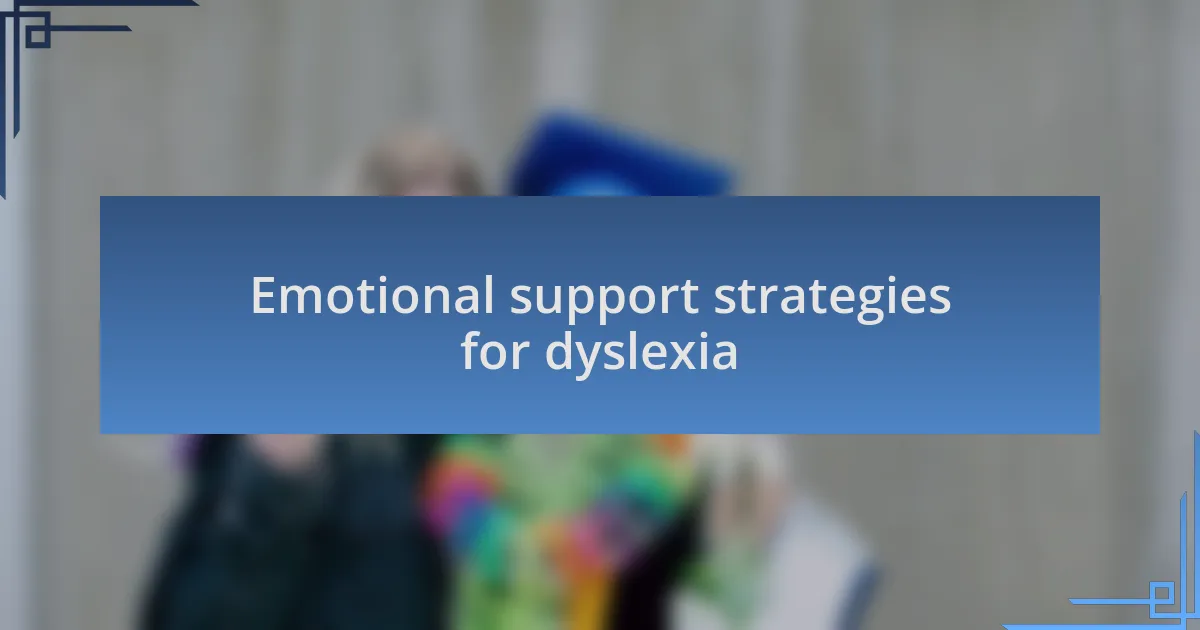
Emotional support strategies for dyslexia
Creating emotional support strategies for individuals with dyslexia can significantly influence their self-esteem and overall well-being. I recall a time when I participated in a dyslexia support group. Sharing our experiences created a safe haven for everyone involved, and I realized that simply acknowledging each other’s struggles made a profound difference. Have you considered how group dynamics can transform individual experiences into shared empowerment?
Another effective strategy I’ve learned is the practice of mindfulness. During stressful moments, I often take a few minutes to breathe deeply and focus on the present. This simple act helps me regain control over racing thoughts that sometimes stem from the challenges of dyslexia. Have you ever experienced how grounding techniques can shift your perspective and enable clearer thinking?
Incorporating positive affirmations into daily routines can also be a game changer. I have a friend who writes encouraging phrases on sticky notes and places them around his workspace. Each time he faces a moment of doubt, those reminders offer a burst of motivation. Wouldn’t it be interesting to explore how such small changes can create a larger impact on our emotional health?
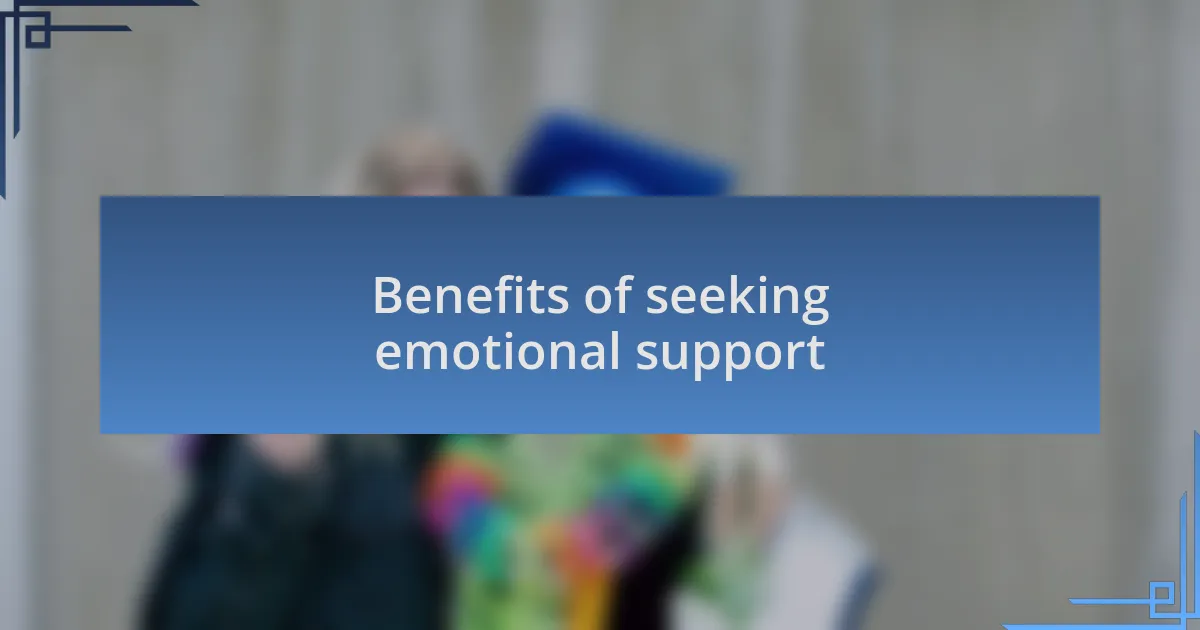
Benefits of seeking emotional support
One major benefit of seeking emotional support is the improvement in mental health that often follows. I remember my first encounter with a therapist who specialized in dyslexia. It was enlightening to share my feelings with someone who understood my struggles, leading to a notable reduction in anxiety and stress levels. Have you ever noticed how simply expressing your thoughts can lighten the emotional load you carry?
Another key advantage is the development of resilience. I’ve seen how connecting with a supportive community can empower individuals to face challenges head-on. During a particularly tough week, I met with friends who shared similar experiences, and we brainstormed ways to tackle our obstacles. It reinforced the belief that setbacks are just stepping stones to growth. Wouldn’t it be powerful to recognize that you’re not alone in your journey?
Additionally, seeking emotional support often leads to enhanced problem-solving skills. Reflecting on moments when I sought advice from others, I realized that discussing issues helped me view them from new angles. I still remember how a supportive friend helped me navigate a daunting task by simply asking the right questions. Isn’t it fascinating how collaboration can inspire innovative solutions when facing difficulties?
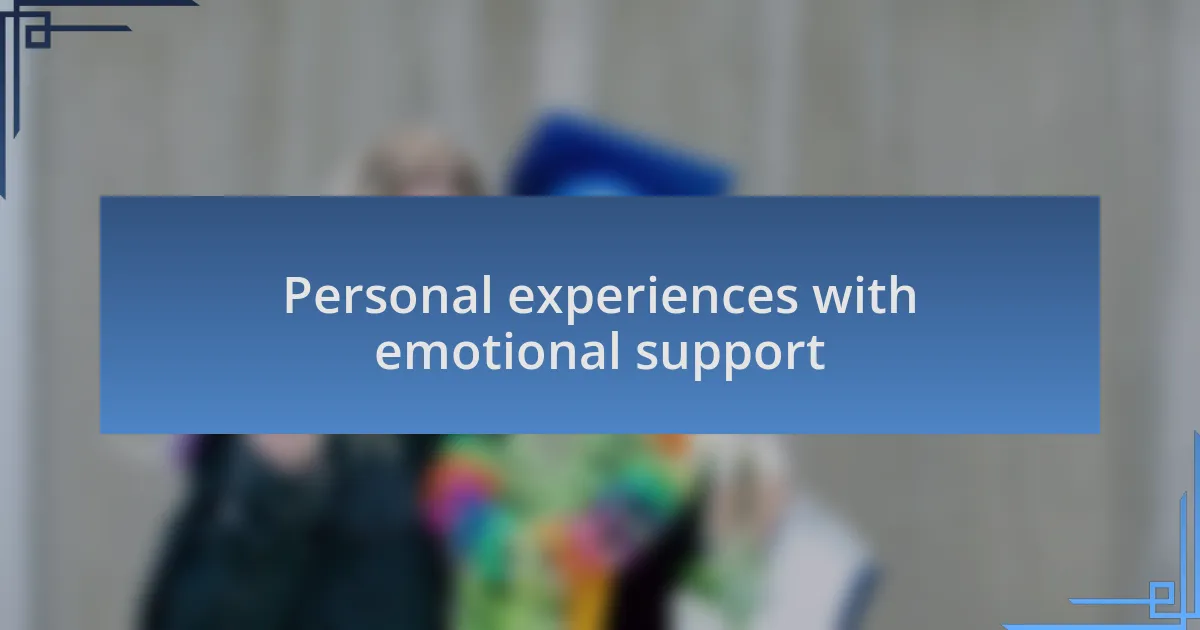
Personal experiences with emotional support
When I think about my journey with emotional support, I can’t help but recall the time I joined a dyslexia support group. Sharing my experiences in that safe space was transformative; I felt an immediate connection and validation that I hadn’t fully experienced before. Have you ever felt that sense of relief when someone else just “gets” your struggles?
Another instance that stands out to me was during a particularly challenging school project, where I faced overwhelming self-doubt. My mentor reached out to check on me, and just her simple act of concern reminded me that I wasn’t alone in this battle. It made me realize how critical it is to have those around you who genuinely care—have you found someone in your life who lifts you up in times of need?
I also recall a moment with my family, where I opened up about the frustration I experienced while reading. Their unwavering support and encouragement not only made me feel understood but also inspired me to push through my challenges. Isn’t it amazing how a few kind words can change your perspective and motivate you to strive for your goals?
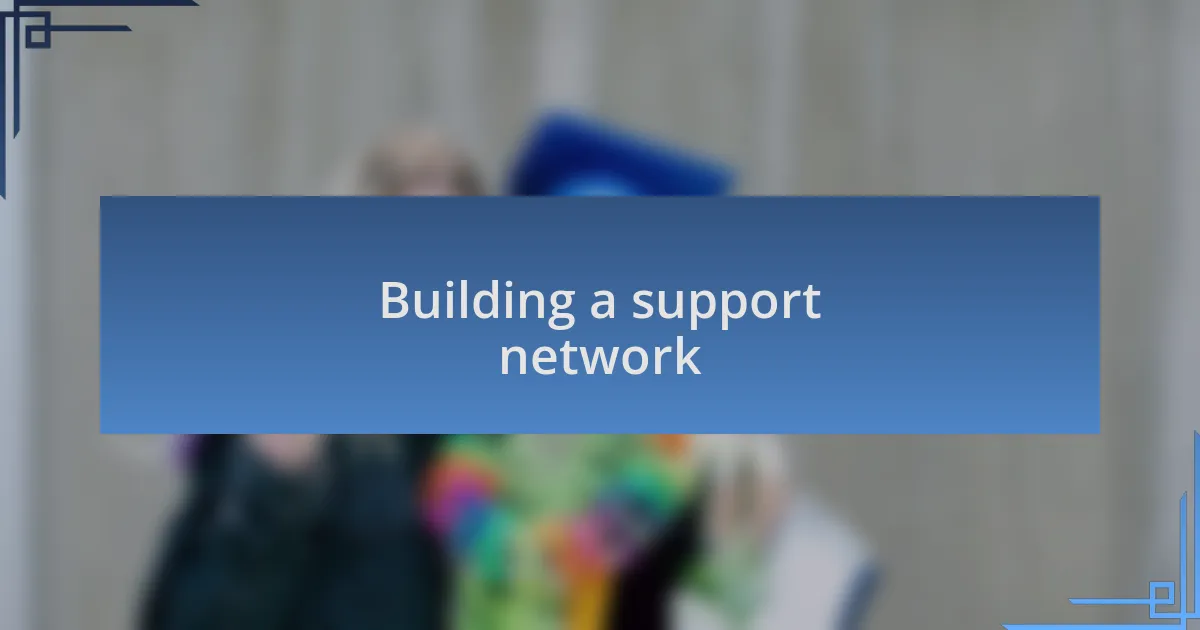
Building a support network
Developing a robust support network has been a pivotal part of navigating my dyslexia journey. I remember reaching out to friends when I was feeling overwhelmed by an upcoming presentation. Their willingness to practice with me not only bolstered my confidence but also highlighted the importance of having people around who are eager to lend a hand. Have you thought about who in your life might support you during tough times?
I’ve also found that connecting with educators who understand dyslexia can be incredibly beneficial. One of my favorite teachers was always open to discussing my learning style and was instrumental in helping me find strategies that worked for me. It made me reflect on how essential it is to cultivate relationships with those who get it; have you sought out mentors or allies who resonate with your challenges?
Participating in online communities dedicated to dyslexia has provided me with a wealth of insight and understanding. I vividly recall a late-night discussion where several members shared their coping strategies, inspiring me to try new approaches. It made me realize that such networks can serve as lifelines; do you take advantage of available resources and communities to strengthen your own support system?
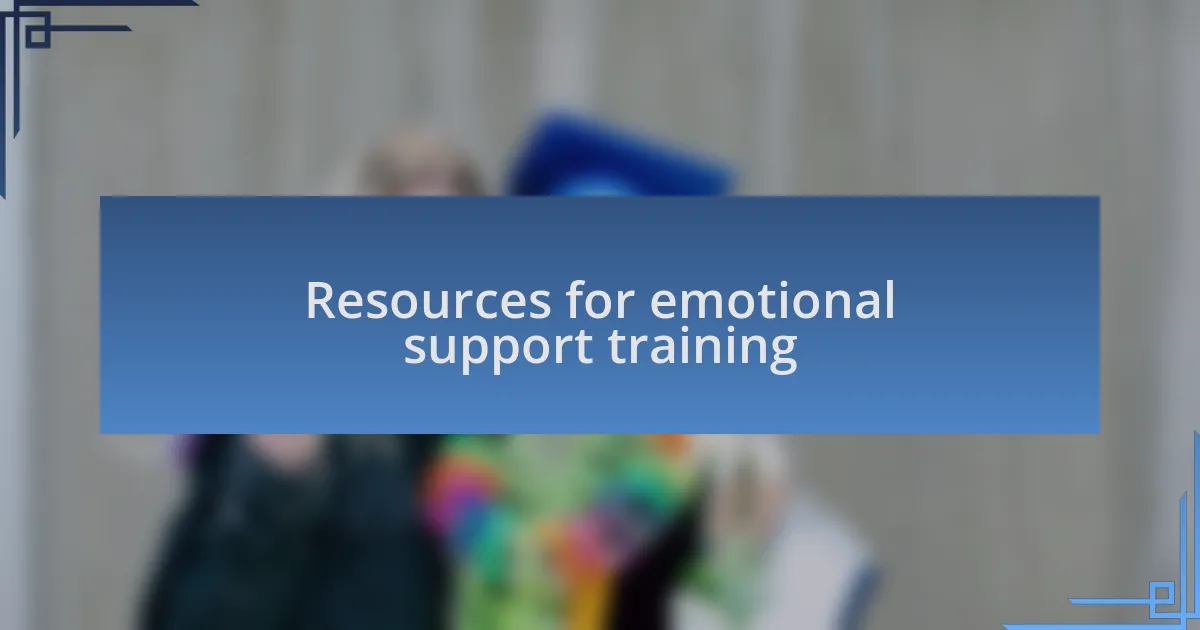
Resources for emotional support training
Finding the right resources for emotional support training has been transformative for me. I remember stumbling upon a workshop specifically designed for individuals with dyslexia, where I learned strategies to manage anxiety and boost self-esteem. Have you ever considered how much a supportive environment can change your perspective on learning?
Books and online courses tailored to emotional support have also been helpful. I often refer to a particular workbook filled with exercises on mindfulness and self-compassion that I discovered a couple of years ago. It encouraged me to reflect on my feelings and challenged me to practice gratitude. Have you explored the potential of these tools to enhance your emotional resilience?
Additionally, connecting with a therapist who specializes in learning differences has proven invaluable. While it initially felt daunting to open up about my experiences, it became a safe haven for exploring my emotions. Have you thought about seeking professional guidance to navigate your feelings? My sessions have not only equipped me with coping techniques, but they also fostered a deeper understanding of my emotional landscape.